英语8种时态讲解练习
英语八大时态结构_含例句

时态(8个):一般现在时: 经常或习惯性的动作结构: 肯定句主语+be (am, is, are ) + 其他 eg: I am Chinese.否定句主语+be not +其他 eg: I am not a boy.疑问句 Be+主语+其他 eg: Are you a girl?或: 肯定句主语+动原+其他 (三单作主语动词要变形)eg: I (He) often get (gets) up early.否定句主语+don't+动原+其他 (三单作主语don't变doesn't)eg: I (She) don’t (doesn’t) like him.疑问句 DO+主语+动原+其他 (三单作主语do变does)eg: Do (Does) you (she) like playing baseball?关键词: sometimes=at times有时,often经常, usually通常, always总是,every day每天, on Sunday afternoon在周日下午, five days a week一周五天, three times a month 一个月三次…现在进行时: 正在发生的动作结构: 肯定句主语+be+动词的现在分词(ing)+其他 eg: I am reading now.否定句主语+be not+动词的现在分词(ing)+其他 eg: I am not working.疑问句 Be +主语+动词的现在分词+其他 eg: Are you sleeping?关键词:now现在, at the moment此刻, look, listen, keep quiet等提示语.一般将来时: 将要发生的动作结构: 肯定句主语+will+动词原型+其他 eg: I will call you later.否定句主语+will not +动词原型+其他 eg: I will not go to the park.疑问句 Will +主语+动词原型+其他 Will you go shopping with her?(will 可改为be going to ,当主语是第一人称时will可用shall)关键词:tomorrow, next year明年, tonight今晚, this year今年, at the end of this term这学期期末, from now on从现在开始, soon一会儿马上, later后稍后,in three days三天之内, in the future 未来…一般过去时: 过去发生的动作强调时间句子结构:肯定句主语+be(was,were)+其他 eg: I was born on July.1st, 2000.否定句主语+be not+其他 eg: I was not born in 1999.疑问句 Be+主语+其他 eg: Were you born in January?或: 肯定句主语+动词的过去式(ed)+其他 Lily went shopping yesterday.否定句主语+did not+动原+其他 eg: He did not go to school today.疑问句 Did+主语+动原+其他eg:Did she pass the test?关键词:yesterday昨天,last week上周, last year去年, 一段时间+ago如ten years ago十年前 five hours ago五小时前, in +年/月,on+具体日期...Just now=a moment ago刚才,in the old days从前, long ago很久以前...过去进行时: 过去正在发生的动作结构: 肯定句主语+was/were+动词的现在分词+其他eg: I was doing my homework at 8 o’clock yesterday evening.否定句主语+was/were not +动词的现在分词+其他They were not staying at home at this moment last Sunday.疑问句 Was/Were + 主语+ 动词的现在分词+其他Were you sleeping when I called you last night?关键词:具体时间如:at ten o'clock yesterday morning, at this moment last Sunday上周日的这个时候...现在完成时: 过去发生的动作对现在造成的影响强调动作或其产生的结果结构:肯定句主语+have/has+动词的过去分词+其他(三单变成has)eg: This year alone, we've already planted ten thousand trees否定句主语+have/has not+动词的过去分词+其他eg: He has not arrived at home yet.疑问句 Have/Has +主语+动词的过去分词+其他eg: Have you been to China?关键词:already已经, yet还, just刚刚, ever曾经, never从不,so far目前, for +一段时间,since+过去的具体时间,this year alone今年以来,these five years alone这五年以来",in the last ten years 在过去的十年中…过去将来时:结构: 肯定句主语+ would+动原+其他 eg: I didn't know if he would come.否定句主语+ would not +动原+其他eg: They were not going to go hiking unless they finished their homework.疑问句 Would+主语+动词原型+其他 (would you like是词组一个固定搭配一般用表示礼貌的问)eg: Would you like to have a dinner with me?(would可改为was/were going to ,主语第一人称时would也可以用should)过去完成时:结构: 肯定句主语+had +动词的过去分词+其他eg: Mr. Smith died yesterday. He had been a good friend of mine.否定句主语+had not +动词的过去分词+其他eg: He said he has not been to America.疑问句 Had+主语+动词的过去分词+其他eg: Had he completed his homework by the time you got there.关键词: 句子中的两个动作都发生在过去一、一般现在时:概念:经常、反复发生的动作或行为及现在的某种状况。
初中英语8种时态复习及专题练习

初中英语8种时态复习I.时态详解一、一般现在时:概念:①表现在存在的状态;②现在经常、反复发生的动作。
时间状语:always,usually,often,sometimes,everyweek(day,year,month…),onceaweek,onSund ays,etc.基本结构:①主语+be(am,is,are);②主语+行为动词原型(单三形式主语+动词单三形式)否定形式:①am/is/are+not;(is+not=isn’t;are+not=aren’t)②此时态的谓语动词若为行为动词,则在其前加don't,如主语为第三人称单数,则用doesn't,同时还原行为动词。
一般疑问句:①把be动词放于句首;②用助动词do提问,如主语为第三人称单数,则用does,同时,还原行为动词。
二、一般过去时:概念:①过去某个时间里发生的动作或状态;②过去习惯性、经常性的动作、行为。
时间状语:ago,yesterday,thedaybeforeyesterday,lastweek(year,night,month…),in1989,jus tnow,attheageof5,oneday,longlongago,onceuponatime,etc.基本结构:①主语+be(was,were);②主语+动词过去式否定形式:①was/were+not;(was+not=wasn’t;were+not=weren’t)②在行为动词前加didn't,同时还原行为动词。
一般疑问句:①was或were放于句首;②用助动词did提问,同时还原行为动词。
三、现在进行时:概念:表示现阶段或说话时正在进行的动作及行为。
时间状语:now,look,listen,atthistime,thesedays,etc.基本结构:be(am,is,are)+doing否定形式:be(am,is,are)+not+doing.一般疑问句:把be动词放于句首。
初中英语 八大时态详解练习

初中英语50个必考句型+ 八大时态结构必背句型句型1:There+be +主语+地点状语/ 时间状语There're three books on the table.桌子上有三本书。
句型2:What's wrong with+sb. / sth.? What's wrong with your telephone?你的手机有什么毛病?句型3:How do you like…?How do you like China?你觉得中国怎么样?句型4:What do you like about…?What do you like about China?你喜欢中国的什么?句型5:had better(not)+动词原形You'd better ask that policeman over there.你最好去问问那边的那个警察。
句型7:Thank+sb.+for (doing) sth. Thank you for coming to see me.感谢你来看我。
句型8:So+be / 情态动词/ 助动词+主语He is a student. So am I.他是一个学生,我也是。
句型9:not…until…He didn't have supper until his parents came back.直到他的父母回来他才吃饭。
句型10:比较级十and+比较级The baby cried harder and harder.那孩子哭得越来越厉害。
句型11:the+比较级,the+比较级The more one has, the more one wants.拥有的越多,想要的越多。
句型12:…as+adj. / adv.+as……not as(so)+adj. / adv.+as…Last Sunday the weather was not so wet as it is today.上个星期天的天气不如今天的天气潮湿。
初中英语八大时态练习题
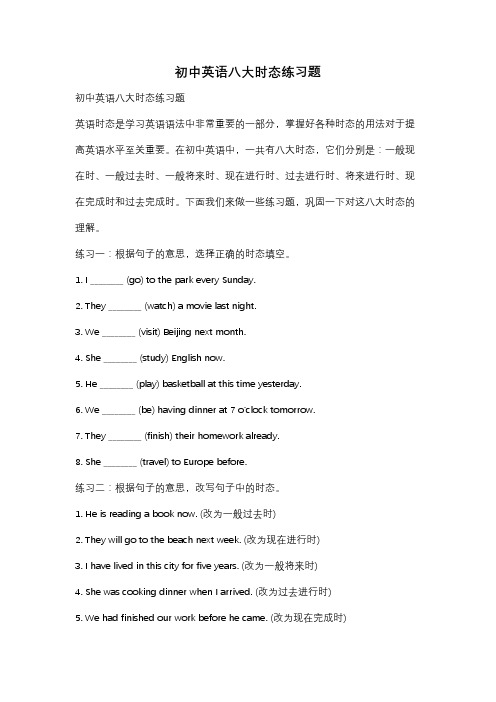
初中英语八大时态练习题初中英语八大时态练习题英语时态是学习英语语法中非常重要的一部分,掌握好各种时态的用法对于提高英语水平至关重要。
在初中英语中,一共有八大时态,它们分别是:一般现在时、一般过去时、一般将来时、现在进行时、过去进行时、将来进行时、现在完成时和过去完成时。
下面我们来做一些练习题,巩固一下对这八大时态的理解。
练习一:根据句子的意思,选择正确的时态填空。
1. I ________ (go) to the park every Sunday.2. They ________ (watch) a movie last night.3. We ________ (visit) Beijing next month.4. She ________ (study) English now.5. He ________ (play) basketball at this time yesterday.6. We ________ (be) having dinner at 7 o'clock tomorrow.7. They ________ (finish) their homework already.8. She ________ (travel) to Europe before.练习二:根据句子的意思,改写句子中的时态。
1. He is reading a book now. (改为一般过去时)2. They will go to the beach next week. (改为现在进行时)3. I have lived in this city for five years. (改为一般将来时)4. She was cooking dinner when I arrived. (改为过去进行时)5. We had finished our work before he came. (改为现在完成时)6. They have been studying English since morning. (改为过去完成时)7. He is going to the concert tomorrow. (改为将来进行时)8. I played soccer with my friends yesterday. (改为一般现在时)练习三:根据句子的意思,用正确的时态填空。
英语常用八种基础时态讲解和练习

英语常用八种基础时态讲解和练习LEKIBM standardization office【IBM5AB- LEKIBMK08- LEKIBM2C】英语时态一般现在时一般现在时通常用动词原形表示,但当主语是第三人称单数(he, she, it, Tom)时需要在在动词原形后面加-e或-es.如:一般现在时的基本用法1.表示主语现在的特征和状态,通常不用时间状语。
He is twelve, she is at home. She likes bread.2. 表示经常发生、反复发生的动作。
这种用法中与always, usually, often, sometimes, hardly ever, never, once a week等频度副词连用。
She often goes to the movies on weekends.--When is your birthday?--My birthday is January 15th.3.表示客观真理、科学事实、格言等。
The sun always rises in the east.太阳总是从东方升起。
The teacher said that the earth goes around the sun.4.一般现在表示将来时。
①. 表示按时间表拟定的或安排好,到时就发生的事情或动作。
The train arrives at 10:30. There is plenty of time.火车十点三十分到达,还有充足的时间。
She comes back next week.她下周会回来。
②在时间状语从句和条件状语从句中。
I will discuss this with you when we meet next time.下次见面时咱们再讨论。
If he arrives, please give me a phone call.现在进行时构成:be(am, is are)+现在分词。
高中英语动词时态练习题及讲解
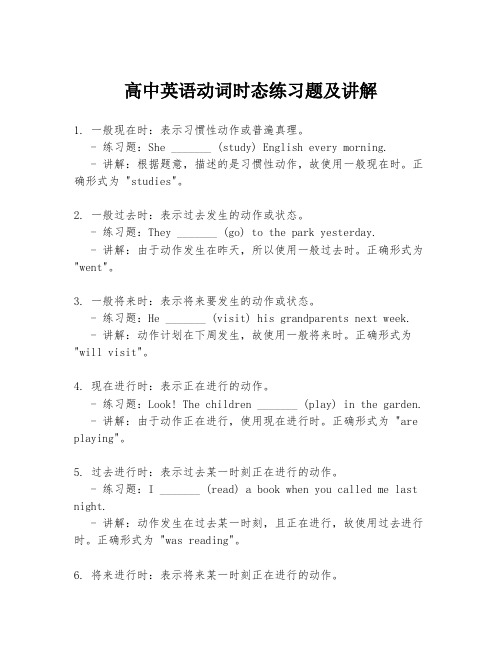
高中英语动词时态练习题及讲解1. 一般现在时:表示习惯性动作或普遍真理。
- 练习题:She _______ (study) English every morning.- 讲解:根据题意,描述的是习惯性动作,故使用一般现在时。
正确形式为 "studies"。
2. 一般过去时:表示过去发生的动作或状态。
- 练习题:They _______ (go) to the park yesterday.- 讲解:由于动作发生在昨天,所以使用一般过去时。
正确形式为"went"。
3. 一般将来时:表示将来要发生的动作或状态。
- 练习题:He _______ (visit) his grandparents next week. - 讲解:动作计划在下周发生,故使用一般将来时。
正确形式为"will visit"。
4. 现在进行时:表示正在进行的动作。
- 练习题:Look! The children _______ (play) in the garden. - 讲解:由于动作正在进行,使用现在进行时。
正确形式为 "are playing"。
5. 过去进行时:表示过去某一时刻正在进行的动作。
- 练习题:I _______ (read) a book when you called me last night.- 讲解:动作发生在过去某一时刻,且正在进行,故使用过去进行时。
正确形式为 "was reading"。
6. 将来进行时:表示将来某一时刻正在进行的动作。
- 练习题:She _______ (be) at a meeting at this time tomorrow.- 讲解:动作将在将来某一时刻进行,使用将来进行时。
正确形式为 "will be"。
7. 现在完成时:表示过去发生的动作对现在有影响或结果。
初中英语时态讲解及练习(全)

时间状语:Tomorrow, next day(week, month, year…),soon, in a few minutes, by…,the day after tomorrow, etc.
否定形式:主语+am/is/are not going to do ; 主语+will/shall not do+其他 一般疑问句:be放于句首;will/shall提到句首。
1.I ____(write, am writing, is writing, are writing) a letter now. 2.Look, it _____(begin, is beginning, am beginning, are beginning) to rain. 3.They ____(study, is studying, am studying, are studying) medicine at the Medical Institute of Chengde these days. 4.He _____(teach, am teaching, is teaching, are teaching) an English lesson at this time.
谓语动词使用过去式形式, 加ed,分为规则和不规则变 化。表示过去经常发生的动 作,也可用“used to do ” 和“would +动词原形”。
1. He____(be, was, were, been) here a moment ago. 2. They ____(be, was, were, been) here just now. 3. The scientists _____(leave, leaves, leaved, left) for America yesterday. 4. Last week we ______(visit, visited ) the Science Museum. 5. When I was a child, I often ____(play, played) football. 6. The students ran out of the classroom as soon as the bell ____(ring, rang, rung).
初中英语八大时态用法详解及真题巩固练习

初中英语八大时态用法详解及真题巩固练习一般现在时1. 概念:经常、反复发生的动作或行为及现在的某种状况。
2. 基本结构:①is/am/are;②do/does否定形式:①am/is/are + not ; ②此时态的谓语动词若为行为动词,则在其前加don't,如主语为第三人称单数,则用doesn't,同时还原行为动词。
3. 一般疑问句:①把 is/am/are 动词放于句首;②用助动词do提问,如主语为第三人称单数,则用does,同时,还原行为动词。
4. 用法:1) 经常性或习惯性的动作,常与表示频度的时间状语连用。
例如:I leave home for school at 7 every morning. 每天早上我七点离开家。
2) 客观真理,客观存在,科学事实。
例如:The earth moves around the sun. 地球绕太阳转动。
Shanghai lies in the east of China. 上海位于中国东部。
3) 表示格言或警句。
例如:Pride goes before a fall. 骄者必败。
注意:此用法如果出现在宾语从句中,即使主句是过去时,从句谓语也要用一般现在时。
例如:I knew that the earth goes around the sun when I was little.我小时候就知道地球绕太阳转。
4) 现在时刻的状态、能力、性格、个性。
例如:I don't want so much. 我不要那么多。
Ann writes good English but does not speak well.安英语写得不错,讲的可不行。
5) 一般现在时表示将来含义a. 下列动词 come, go, arrive, leave, start, begin, return 的一般现在时可以表示将来,主要用来表示在时间上已确定或安排好的事情。
初中英语八大时态全套精讲及练习题(附答案)
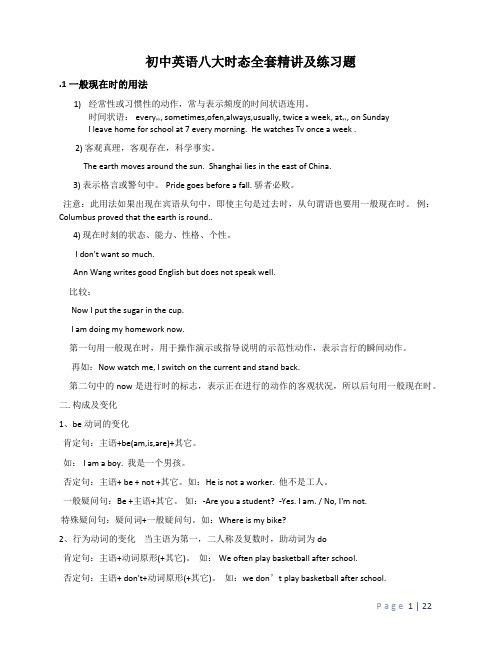
初中英语八大时态全套精讲及练习题.1 一般现在时的用法1)经常性或习惯性的动作,常与表示频度的时间状语连用。
时间状语: every…, sometimes,ofen,always,usually, twice a week, at…, on SundayI leave home for school at 7 every morning. He watches Tv once a week .2) 客观真理,客观存在,科学事实。
The earth moves around the sun. Shanghai lies in the east of China.3) 表示格言或警句中。
Pride goes before a fall. 骄者必败。
注意:此用法如果出现在宾语从句中,即使主句是过去时,从句谓语也要用一般现在时。
例:Columbus proved that the earth is round..4) 现在时刻的状态、能力、性格、个性。
I don't want so much.Ann Wang writes good English but does not speak well.比较:Now I put the sugar in the cup.I am doing my homework now.第一句用一般现在时,用于操作演示或指导说明的示范性动作,表示言行的瞬间动作。
再如:Now watch me, I switch on the current and stand back.第二句中的now是进行时的标志,表示正在进行的动作的客观状况,所以后句用一般现在时。
二. 构成及变化1、be动词的变化肯定句:主语+be(am,is,are)+其它。
如: I am a boy. 我是一个男孩。
否定句:主语+ be + not +其它。
如:He is not a worker. 他不是工人。
初中英语八种时态详解及练习
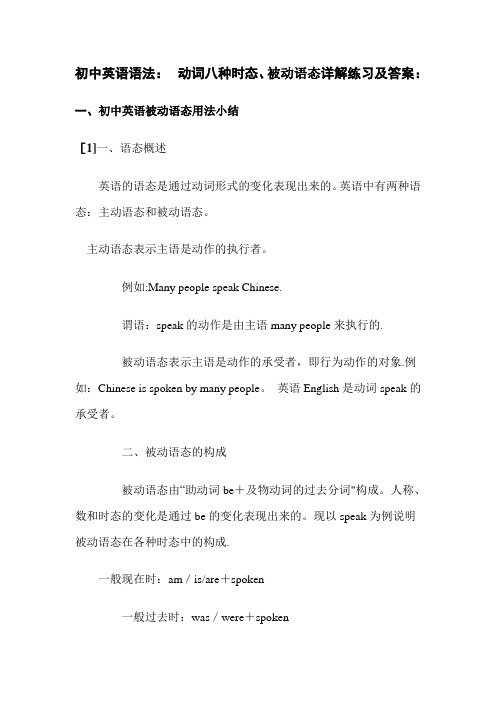
初中英语语法:动词八种时态、被动语态详解练习及答案:一、初中英语被动语态用法小结[1]一、语态概述英语的语态是通过动词形式的变化表现出来的。
英语中有两种语态:主动语态和被动语态。
主动语态表示主语是动作的执行者。
例如:Many people speak Chinese.谓语:speak的动作是由主语many people来执行的.被动语态表示主语是动作的承受者,即行为动作的对象.例如:Chinese is spoken by many people。
英语English是动词speak的承受者。
二、被动语态的构成被动语态由“助动词be+及物动词的过去分词"构成。
人称、数和时态的变化是通过be的变化表现出来的。
现以speak为例说明被动语态在各种时态中的构成.一般现在时:am/is/are+spoken一般过去时:was/were+spoken一般将来时:will/shall be+spoken现在进行时:am/is/are being+spoken过去进行时:was/were being+spoken现在完成时:have/has been+spoken过去完成时:had been + spoken三、被动语态的用法(1)不知道或没有必要说明动作的执行者是谁。
例如:Some new computers were stolen last night.一些新电脑在昨晚被盗了.(不知道电脑是谁偷的)This bridge was founded in 1981。
这座桥竣工于1981年。
(2)强调动作的承受者,而不强调动作的执行者。
例如:The glass was broken by Mike.玻璃杯是迈克打破的。
This book was written by him.这本书是他写的.Your homework must be finished on time.你们的家庭作业必须及时完成。
四、主动语态变被动语态的方法(1)把主动语态的宾语变为被动语态的主语。
初中英语语法-八种时态详解与练习

初中英語語法:八種時態詳解與練習一.概念:英語中表示不同時間發生の動作或存在の狀態,需用不同の動詞形式表示,這種不同の動詞形式稱為時態。
二.種類:(基本時態)一般現在時一般過去時現在進行時過去進行時一般將來時過去將來時現在完成時過去完成時一般現在時一、概念:經常、反複發生の動作或行為及現在の某種狀況。
二、常搭配の時間狀語:always, usually, often, sometimes, every week (day, year, month…), once a week,on Sundays, etc.三、基本結構①be動詞(is,am,are);②行為動詞(主語是第三人稱單數時謂語動詞要加s或es外) 否定形式:①am/is/are+not;②此時態の謂語動詞若為行為動詞,則在其前加don't,如主語為第三人稱單數,則用doesn't,同時還原行為動詞。
一般疑問句:①把be動詞放於句首;②用助動詞do提問,如主語為第三人稱單數,則用does,同時,還原行為動詞。
例句:I go to school at 6 every morning. 每天早上我七點去上學。
Summer follows spring. 春天之後是夏天。
I learned that the earth goes around the sun when I was in primary school. 我在小學就學過地球是圍繞太陽轉の。
Pride goes before a fall. 驕者必敗。
四、基本用法:1) 描述當前時間內經常出現、反複發生の動作或存在の狀態。
在這種情景中,句子常帶有表示頻率の時間狀語:always , everyday , often , once a week (month , year , etc.) , sometimes , seldom , usually等等,以表示句中の動作或狀態是習慣性の、經常性の。
初中英语八大时态详细语法解析习题及答案
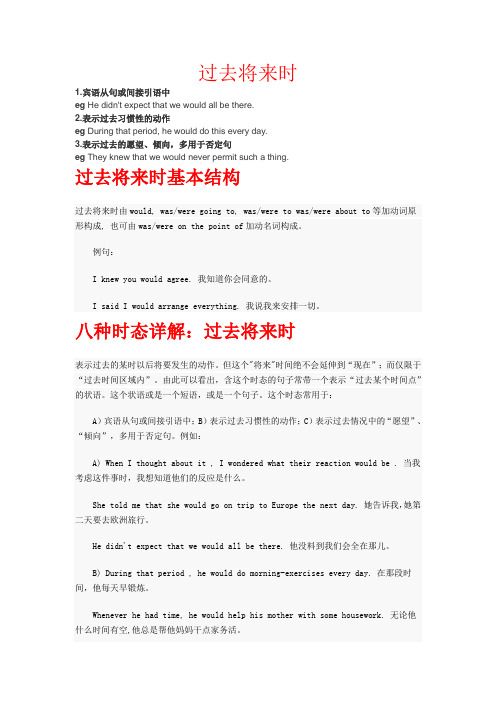
过去将来时1.宾语从句或间接引语中eg He didn't expect that we would all be there.2.表示过去习惯性的动作eg During that period, he would do this every day.3.表示过去的愿望、倾向,多用于否定句eg They knew that we would never permit such a thing.过去将来时基本结构过去将来时由would, was/were going to, was/were to was/were about to等加动词原形构成, 也可由was/were on the point of加动名词构成。
例句:I knew you would agree. 我知道你会同意的。
I said I would arrange everything. 我说我来安排一切。
八种时态详解:过去将来时表示过去的某时以后将要发生的动作。
但这个"将来"时间绝不会延伸到“现在”;而仅限于“过去时间区域内”。
由此可以看出,含这个时态的句子常带一个表示“过去某个时间点”的状语。
这个状语或是一个短语,或是一个句子。
这个时态常用于:A)宾语从句或间接引语中;B)表示过去习惯性的动作;C)表示过去情况中的“愿望”、“倾向”,多用于否定句。
例如:A) When I thought about it , I wondered what their reaction would be . 当我考虑这件事时,我想知道他们的反应是什么。
She told me that she would go on trip to Europe the next day. 她告诉我,她第二天要去欧洲旅行。
He didn't expect that we would all be there. 他没料到我们会全在那儿。
英语八大时态结构_含例句

时态(8个):一般现在时: 经常或习惯性的动作结构: 肯定句主语+be (am, is, are ) + 其他 eg: I am Chinese.否定句主语+be not +其他 eg: I am not a boy.疑问句 Be+主语+其他 eg: Are you a girl?或: 肯定句主语+动原+其他 (三单作主语动词要变形)eg: I (He) often get (gets) up early.否定句主语+don't+动原+其他 (三单作主语don't变doesn't)eg: I (She) don’t (doesn’t) like him.疑问句 DO+主语+动原+其他 (三单作主语do变does)eg: Do (Does) you (she) like playing baseball?关键词: sometimes=at times有时,often经常, usually通常, always总是,every day每天, on Sunday afternoon在周日下午, five days a week一周五天, three times a month 一个月三次…现在进行时: 正在发生的动作结构: 肯定句主语+be+动词的现在分词(ing)+其他 eg: I am reading now.否定句主语+be not+动词的现在分词(ing)+其他 eg: I am not working.疑问句 Be +主语+动词的现在分词+其他 eg: Are you sleeping?关键词:now现在, at the moment此刻, look, listen, keep quiet等提示语.一般将来时: 将要发生的动作结构: 肯定句主语+will+动词原型+其他 eg: I will call you later.否定句主语+will not +动词原型+其他 eg: I will not go to the park.疑问句 Will +主语+动词原型+其他 Will you go shopping with her?(will 可改为be going to ,当主语是第一人称时will可用shall)关键词:tomorrow, next year明年, tonight今晚, this year今年, at the end of this term这学期期末, from now on从现在开始, soon一会儿马上, later后稍后,in three days三天之内, in the future 未来…一般过去时: 过去发生的动作强调时间句子结构:肯定句主语+be(was,were)+其他 eg: I was born on July.1st, 2000.否定句主语+be not+其他 eg: I was not born in 1999.疑问句 Be+主语+其他 eg: Were you born in January?或: 肯定句主语+动词的过去式(ed)+其他 Lily went shopping yesterday.否定句主语+did not+动原+其他 eg: He did not go to school today.疑问句 Did+主语+动原+其他eg:Did she pass the test?关键词:yesterday昨天,last week上周, last year去年, 一段时间+ago如ten years ago十年前 five hours ago五小时前, in +年/月,on+具体日期...Just now=a moment ago刚才,in the old days从前, long ago很久以前...过去进行时: 过去正在发生的动作结构: 肯定句主语+was/were+动词的现在分词+其他eg: I was doing my homework at 8 o’clock yesterday evening.否定句主语+was/were not +动词的现在分词+其他They were not staying at home at this moment last Sunday.疑问句 Was/Were + 主语+ 动词的现在分词+其他Were you sleeping when I called you last night?关键词:具体时间如:at ten o'clock yesterday morning, at this moment last Sunday上周日的这个时候...现在完成时: 过去发生的动作对现在造成的影响强调动作或其产生的结果结构:肯定句主语+have/has+动词的过去分词+其他(三单变成has)eg: This year alone, we've already planted ten thousand trees否定句主语+have/has not+动词的过去分词+其他eg: He has not arrived at home yet.疑问句 Have/Has +主语+动词的过去分词+其他eg: Have you been to China?关键词:already已经, yet还, just刚刚, ever曾经, never从不,so far目前, for +一段时间,since+过去的具体时间,this year alone今年以来,these five years alone这五年以来",in the last ten years 在过去的十年中…过去将来时:结构: 肯定句主语+ would+动原+其他 eg: I didn't know if he would come.否定句主语+ would not +动原+其他eg: They were not going to go hiking unless they finished their homework.疑问句 Would+主语+动词原型+其他 (would you like是词组一个固定搭配一般用表示礼貌的问)eg: Would you like to have a dinner with me?(would可改为was/were going to ,主语第一人称时would也可以用should)过去完成时:结构: 肯定句主语+had +动词的过去分词+其他eg: Mr. Smith died yesterday. He had been a good friend of mine.否定句主语+had not +动词的过去分词+其他eg: He said he has not been to America.疑问句 Had+主语+动词的过去分词+其他eg: Had he completed his homework by the time you got there.关键词: 句子中的两个动作都发生在过去一、一般现在时:概念:经常、反复发生的动作或行为及现在的某种状况。
(完整版)初中英语8种时态练习及答案
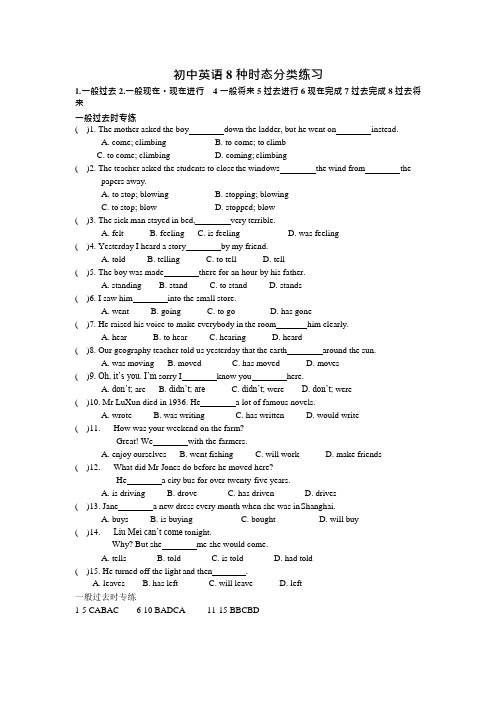
初中英语8 种时态分类练习1.一般过去2.一般现在。
现在进行 4 一般将来5 过去进行6 现在完成7 过去完成8 过去将来一般过去时专练( )1. The mother asked the boy down the ladder, but he went on instead.A. come; climbingB. to come; to climbC. to come; climbingD. coming; climbing( )2. The teacher asked the students to close the windows the wind from the papers away.A. to stop; blowingB. stopping; blowingC. to stop; blowD. stopped; blow( )3. The sick man stayed in bed, very terrible.A. feltB. feelingC. is feelingD. was feeling( )4. Yesterday I heard a story by my friend.A. toldB. tellingC. to tellD. tell( )5. The boy was made there for an hour by his father.A. standingB. standC. to standD. stands( )6. I saw him into the small store.A. wentB. goingC. to goD. has gone( )7. He raised his voice to make everybody in the room him clearly.A. hearB. to hearC. hearingD. heard( )8. Our geography teacher told us yesterday that the earth around the sun.A. was movingB. movedC. has movedD. moves( )9. Oh, it’s you. I’m sorry I know you here.A. don’t; areB. didn’t; areC. didn’t; wereD. don’t; were( )10. Mr LuXun died in 1936. He a lot of famous novels.A. wroteB. was writingC. has writtenD. would write( )11. --- How was your weekend on the farm?--- Great! We with the farmers.A. enjoy ourselvesB. went fishingC. will workD. make friends( )12. --- What did Mr Jones do before he moved here?--- He a city bus for over twenty-five years.A. is drivingB. droveC. has drivenD. drives( )13. Jane a new dress every month when she was in Shanghai.A. buysB. is buyingC. boughtD. will buy( )14. --- Liu Mei can’t come tonight.--- Why? But she me she would come.A. tellsB. toldC. is toldD. had told( )15. He turned off the light and then .A. leavesB. has leftC. will leaveD. left一般过去时专练1-5CABAC 6-10 BADCA 11-15 BBCBD一般现在时与现在进行时专练( ) 1. Father usually his newspaper after dinner.A. readB. readsC. readingD. is reading( ) 2. The Blacks often to the cinema on Saturday evenings.A. goB. goesC. is goingD. are going( ) 3.Look! The boy with his mother in the pool.A. is swimmingB. is swimmingC. are swimmingD. are swiming( ) 4.--- What is Tom doing in the classroom? --- He something on the blackboard.A. drawsB. drawC. is drawingD. are drawing.( ) 5.Old Tom usually up at six and sports in the garden.A. gets, dosB. gets, doesC. get, doesD. gets, do( ) 6. It’s ten o’c lock and Jack still(仍然) his homework.A. is, doB. is, doingC. are, doD. are, doing( ) 7. The waiters to work at five every morning.A. startB. startsC. startingD. are starting( ) 8.I a letter, so I can’t go out with you.A. is writingB. am writingC. am writeingD. am writting( )9.A hundred days quite a long time.A. isB. areC. haveD. has( )10. -- late for the meeting next time. –Sorry, I won’t.A. Don’tB. Don’t beC. Won’t beD. Be not( )11. My mother noodles, but my father .A. likes, doesn’tB. don’t like, doC. likes, didn’tD. didn’t like, do( )12. The picture nice.A. looksB. is lookedC. lookD. is looking( )13. The students will go to the Summer Palace if it tomorrow.A. don’t rainB. doesn’t rainC. won’t rainD. isn’t rain( )14. We are always ready others.A. to helpingB. to helpC. helpD. helping( )15. I often hear her about the boy.A. talkingB. talkC. to talkD. talked( )16. He’s already a little weak in Chinese, he ?A. isB. isn’tC. hasD. hasn’t( )17.Potatoes are in the field by the farmers.A. growB. growingC. grownD. grew( )18. Does she have a watch? – Yes, she .A. haveB. doC. hasD. does( )19. She English very much now.A. is likingB. likesC. likedD. is teaching( )20. She has no paper to . Why not give her some?A. writeB. be writingC. write onD. write in( )21. Does Mr Know-all know keys?A. to makeB. how to makeC. how makeD. making( )22. Does your mother English now?A. teachesB. teachC. taughtD. is teaching( )23. Jack usually mistakes last term. But this term he does better.A. makesB. madeC. doesD. did( )24. The boy is too young, please carefully.A. look after himB. look him afterC. look at himD. look him at ( )25. She you to come to my birthday party.A. hopesB. wishesC. wantD. lets( )26. --Where is Frank now? -- He his bike in the yard.A. fixes upB. fixing upC. is fixing upD. fixed( )27. Bob often his mother with the housework on Sundays.A. helpB. helpingC. helpsD. helped( )28. The students will go to the Summer Palace if it tomorrow.A. don’t rainB. doesn’t rainC. won’t rainD. isn’t rain( )29. If it tomorrow, I will go by car.A. rainB. will rainC. rainsD. would rain( )30. --What a nice garden! –She it every day.A. is cleaningB. has cleanedC. cleansD. clean( )31. --Where is Peter? -- He his homework in the room.A. is doingB. doesC. didD. do( )32. The teacher told us that light much faster than sound.A. travelsB. traveledC. wasD. will be( )33. My mother told us that Taiwan part of China.A. isB. areC. wasD. were( )34. Do you know bananas in Hainan?A. growsB. is grownC. grewD. are grown( )35. The clothes very soft.A. are feltB. are feelingC. feelD. feels( )36. The supermarket is far from Mary’s house. So she only once a week.A. goes shoppingB. has been thereC. was shoppingD. has gone there ( )37. Don’t make so much noise. We to the music.A. are listeningB. listenC. listenedD. have listened( )38. I’ll go swimming with you if I free tomorrow.A. will beB. shall beC. amD. was( )39. – Oh, Mrs. King, your sweater looks nice. Is it wool ?-- Yes, and it’s Inner Mongolia.A. made of, made byB. made of, made inC. made by, made forD. made by, made from一般现在时与现在进行时专练1-5BAACB 6-10BABAB 11-15AABBB 16-20 BCDBC21-25 BBBAC 26-30 CCBAC 31-35 AAABC 36-39 AACB3.一般将来时专练( )1. Her hope the 2008 Olympic Games.A. to take part inB. is to take part inC. taking part inD. will take part in( )2. --- Can I go to Beijing for my holiday, Dad? --- You can when you a bit older.A. will getB. getC. are gettingD. got( )3. If he harder, he will catch up with us soon.A. studyB. studiesC. will studyD. studied( )4. --- Don’t forget to ask him to write to me.--- I won’t. As soon as he , I’ll ask him to write to you.A. will comeB. cameC. comesD. is coming( )5. --- Jimmy is leaving for a holiday.--- Really? Where he ?A. has; goneB. will; goC. did; goD. would; go( )6. Frank to see his grandma if he free tomorrow.A. will come; will beB. comes; isC. will come; isD. comes; will be( )7. There a talk on science in our school next Monday.A. will giveB. will beC. is going to giveD. is( )8. --- Shall we go shopping now?--- Sorry, I can’t. I my shirts.A. washB. washesC. washedD. am washing( )9. I believe that those mountains with trees in a few years’ time.A. are coveredB. will be coveredC. are coveringD. will cover( )10. It is said that about 400 cars in the factory next month.A. were producedB. will produceC. are producedD. will be produced( )11. --- Are you free this afternoon?--- No. I’ll have an English composition this afternoon.A. to writeB. wroteC. to be writingD. to be written( )12. --- Come back home every month.--- I .A. willB. mustC. shouldD. can( )13. A robot think of itself; it be told what to do.A. can’t; mustB. couldn’t; canC. may not; willD. mustn’t, may一般将来时专练1-5 BBBCB 6-10 CBDBD 11-13 AAA4.过去进行时专练二、用动词的适当形式填空。
八大时态练习题
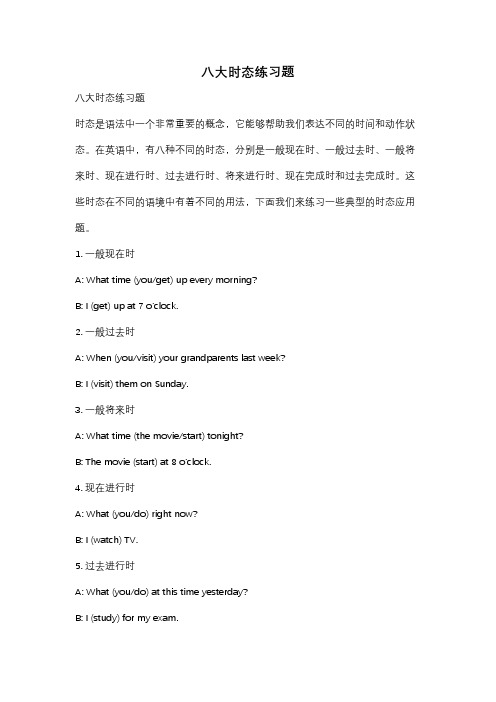
八大时态练习题八大时态练习题时态是语法中一个非常重要的概念,它能够帮助我们表达不同的时间和动作状态。
在英语中,有八种不同的时态,分别是一般现在时、一般过去时、一般将来时、现在进行时、过去进行时、将来进行时、现在完成时和过去完成时。
这些时态在不同的语境中有着不同的用法,下面我们来练习一些典型的时态应用题。
1. 一般现在时A: What time (you/get) up every morning?B: I (get) up at 7 o'clock.2. 一般过去时A: When (you/visit) your grandparents last week?B: I (visit) them on Sunday.3. 一般将来时A: What time (the movie/start) tonight?B: The movie (start) at 8 o'clock.4. 现在进行时A: What (you/do) right now?B: I (watch) TV.5. 过去进行时A: What (you/do) at this time yesterday?B: I (study) for my exam.6. 将来进行时A: What (you/do) this time tomorrow?B: I (work) on a project.7. 现在完成时A: How many books (you/read) so far this year?B: I (read) ten books.8. 过去完成时A: By the time I arrived, they (already/leave).B: Oh no, I (miss) them.这些练习题涵盖了八种不同的时态,让我们更好地理解和掌握它们的用法。
一般现在时用于描述经常性的动作或事实,一般过去时用于过去发生的动作或事情,一般将来时用于表示将来的动作或计划,现在进行时用于描述正在进行的动作,过去进行时用于过去某个时间正在进行的动作,将来进行时用于描述将来某个时间正在进行的动作,现在完成时用于描述过去发生的动作对现在造成的影响,过去完成时用于描述过去某个时间之前已经完成的动作。
中考英语八大时态总结与练习

中考语法时态复习一般现在时概念:1. 表示现在的状态eg:I am twelve.2. 表示经常或习惯性动作eg:he gets up at six.3. 表示主语所具备的性格或能力eg:he likes English.4. 表示客观事实真理eg:the earth goes around the sun.标志性词语:Often,usually,sometimes,always,never,on Sunday,every year/month/dayEg: she often goes to school on foot.He goes to park once a week.行为动词第三人称单数加-s 的形式1. 一般动词直接加-s2. 以辅音字母+y,把 y 改 i 再加 es,3. 以 s,x,sh,ch 结尾的动词加-es4. 以 o 结尾的动词一般加-es5. 特殊情况:have—has基本结构: Be 型:肯定式:主语+be 动词(am/is/are)+其他表状态(there be+n)否定式:主语+be 动词(am/is/are)+not+其他疑问式:将 be 动词提前放句首,第三人称动词变原形(一二人称互换,第三人称不变)特殊式:特殊疑问词+be+主语实义动词型:肯定式:主语+行为动词(注意人称三单形式)+其他否定式:主语+do n’t/doesn’t+行为动词+其他疑问式:一般式:Do/Does+主语+行为动词原形+其他特殊式:特殊疑问词+do/does+主语+谓语小试牛刀:写出下列动词的第三人称形式wash:match:study:finish:go:snow:carry:stop:see:drive:let:teach:keep:join:put:do:drink:toy:play: begin:take:run:fly:talk:stay:look:watch:think:carry:fix:单项选择1. There an English film at the cinema now.A:is B:are C:am D:be2. The picture nice.A:look B:looks C:looked D:be look3. He sits down and soon asleep.A:fall B:falling C:falled D: falls4. The water sweet.A:drinking B:drinks C:drink D:to drink5. I up at six but Mike up at sevenA:get,gets B:get ,get C:gets,get D:getting, to get6. My father for eight hours every day.A:working B:works C:work D:to work7. Uncle Wang never English, because he know how to say it.A:speak,doesn’t B:speak,don’t C:speaks,don’t D:speaks,doesn’t 8. On Sunday my daughter watching TV and my son to play footballwith his friends.A:like,want B:likes,want C:like,wants D:likes,wants 9. Su Yang usually some clothes on Sunday.A:washed B:washs C:washes D:washing 10. Su Hai and Su Yang eight lessons this term.A:have B:has C:haves D:having用所给词的正确形式填空A. We often (not play)on the playground.B.you (brush) your teeth every day.C. How many lessons your classmate (have) on Sunday.D. It(take) me two hours to finish my homework every day.E. The child often (watch) TV in the evening.F. What (do) he usually (do) after school.G. John (study) Math , Chinese ,English ,Science and Art at school. H. Mr. Wang often (go) to Shanghai.I. There (be) a football match on TV every morning.J. We (not watch)TV on Monday.句式训练Do you like to play football after school?肯定句肯定/否定回答:I have many books.否定句:一般疑问句:肯定回答:否定回答:Nancy doesn’t run fast.肯定句:I usually play football on Friday afternoon.否定句:一般疑问句:特殊疑问句:肯定/否定回答:Tom does his homework at home.否定句:一般疑问句:特殊疑问句:Mike has two letters for him.否定句:一般疑问句:特殊疑问句:否定回答:判断正误1. Is your brother speak English?2. Does he likes going fishing?3. Jane do his homework every morning.4. He like play basketball with his friends.5. We eats dinner at six and go to bed at eleven.6. My dog runs fast.7. He speak English very well.8. What do they usually do on Saturday.9. My mother don’t have breakfast this morning.10. I like reading books on the library every day.中考真题1.Jenny! Do you know that one-third of the boys in our class the singer Zhang Shao Han?A. likeB. likesC.liking2. The sense of happiness will increase if you what you like to do.A. doB. didC. will do3. Betty will ring me up when she inBeijing.A. arriveB. arrivesC. arrivedD. willarrive4. If you your homework, you can go out to play football.5.Now my father his bike to work every day instead of driving.A. rideB. r od eC. ridesD. will ride6. This girl is rea d y t o help p eo pl e an y time. Wh e n sh e is on t h e bu s,sh e al w a y s her seat to someone in need.A. givesB. giveC. gaveD.giving概念:一般过去时表示过去某个时间収生的动作或存在的状态. Eg: I got up at seven yesterday表示过去经常収生的动作或存在的状态. Eg: he always went to school by car last term标志性词语:yesterday,last month/year/week/night,the day before yesterday,in the past,at that time,two days ago,just n ow……..动词过去时的变化规则:一般在词尾直接+ed play——played以 e 结尾的动词直接+d taste—— tasted末尾三个字母以“辅+元+辅”且为重读闭音节,双写末尾辅音+ed stop——stopped以辅音字母+y,改 y 为 i 再+ed study——studied不规则动词过去式:am/is: a re:do:see:sa y:give: eat:w rit e: sp en d:get:take:sp eak:drin k:g o:r un:rid e:sle ep:c o me:sin g:swim:s t and:has/ha ve:pu t:sit:rea d:结构:Be 型肯定式:主语+be 动词(was/were)+其他否定式:主语+wasn’t/weren’t+其他疑问式:Be 动词+主语+其他(一二人称互换,第三人称不变)特殊疑问句:特殊疑问词+was/were+主语+其他实义动词型肯定式:主语+动词过去式+其他否定式:主语+didn’t+动词原形+其他疑问式:Did+主语+动词原形+其他特殊疑问句:特殊疑问词+did+主语+动词原形+其他用所给单词正确形式填空◆We (enjoy) ourselves at the party last night.◆Jack (study) for the English test last Sunday.◆ you (go) to the Great Wall last year?◆What day (be) it yesterday?◆The old man (be)ill and went to see a doctor.◆We (have) a party last night.◆We (visit) the museum and went home.◆—How (be) the students? —They were very friendly.◆My mother (not do) housework yesterday.◆—he (have) lunch at nine? —No, he did n’t.◆They (buy) a guitar yesterday.◆the cat (eat)a bird yesterday night.◆They (play)chess in the classroom last PE lesson.◆Nancy (pick)up orange on the farm last week.◆My mother (cook)a nice food last spring festival.◆I (be)at school just now.◆He (be)at the camp last week.◆The mobile phone (be)on the table yesterday evening.◆I (make)a model ship with Mike yesterday.◆What (do)you do last month.单项选择( ) 1. Lee his mobile phone at home.A. leaveB. leavesC. leavedD. left( ) 2. he a good rest? No, he didn’t.A. Do, hadB. Did, haveC. Did, hadD. Was, had( ) 3. As soon as he , he to his family.A. arrived, writesB. arrived, writtenC. arrived, wroteD. arriveds, write( ) 4. Mr. Black was late because he his way.A. lostedB. loseC. losesD. lost( ) 5. When Lee school this morning?A. did, got toB. did, get toC. did, getD. did, got( ) 6. Will you please say it again? I quite you.A. didn’t, hearB. don’t, heardC. didn’t, heardD. don’t, hear ( ) 7. you at six o’c lock yesterday?A. Do ,get upB. Did, get upC. Do, got upD. Did, got up ( ) 8.What did you see ?A. nowB. every dayC. these daysD. just now ( ) 9.He went into the room and the door.A. lockB. lockingC. locksD. locked ( ) 10. —What you last week? —I bought a bag.A. did ,buyB. did , boughtC. do, buyD. do, bought ( ) 11. —he his lunch? —Yes, he did.A. Does ,hasB. Does, haveC. Did, haveD. Did, had ( )12.—Did the thieves into the car? —No, they .A. fell, did n’tB. fall(落下), didC. jump(跳), didn’tD. jump, did ( ) 13. -When did May come back from Hong Kong?-She from Hong Kong last Friday.A. come backB. comes backC. returned backD. came back ( ) 14. she this dictionary in the bookshop nearby last week?A. Did, buyB. Does, buyC. Did, boughtD. Does, buys ( ) 15. He to the station this morning and was for the train.A. hurry, in timeB. hurries, on timeC. hurried, in timeD. hurried, at time句型转换1. Frank read an interesting book about history. (一般疑问句)Frank an interesting book about history?2. Thomas spent RMB 10 on this book. (否定句)Thomas RMB 10 on this book.3. I didn’t have any friends. (一般疑问句)have friends?4. She watched TV after supper(划线部分提问)she after supper.5. There was some orange in the fridge.(一般疑问句)there_ orange in the fridge?改错题1. How is Jane yesterday?2. He go to school by bus last week.3. He often goes home at 6:00 last month.4. I can fly kites seven years ago.5. Did you saw him just now.6. Tom wasn’t watch TV last night.7. I didn’t my homework yesterday. 8. He wait for you three hours ago.9. Who find it just now ? 10. What did he last week?综合训练1. They read English last night.否定句:一般疑问句:肯定/否定回答:划线部分提问:2. She didn’t buy a dictionary last week.肯定句:一般疑问句:肯定/否定回答:划线部分提问:一般将来时概念:现在看将要収生的动作或存在的状态.标志性词语:Tomorrow,soon,next year,next year / week / month, in a few days, in the future, this afternoon,the day after tomorrow,one hour later,tomorrow morning。
英语八大时态介绍(附练习题)

英语八大时态介绍一般现在时一般现在时基本用法介绍:(一)一般现在时的功能1.表示事物或人物的特征、状态。
如:The sky is blue.天空是蓝色的。
2.表示经常性或习惯性的动作。
如:I get up at six every day.我每天六点起床。
3.表示客观现实。
如:The earth goes around the sun.地球绕着太阳转。
(二)一般现在时的构成1.be动词:主语+be(am,is,are)+其它。
如:I am a boy.我是一个男孩。
2.行为动词:主语+行为动词(+其它)。
如:We study English.我们学习英语。
当主语为第三人称单数(he, she,it)时,要在动词后加"-s"或"-es"。
如:Mary likes Chinese.玛丽喜欢汉语。
(三)一般现在时的变化1. be动词的变化。
否定句:主语+ be + not +其它。
如:He is not a worker.他不是工人。
一般疑问句:Be +主语+其它。
如:-Are you a student? -Yes. I am. / No, I'm not.特殊疑问句:疑问词+一般疑问句。
如:Where is my bike?2.行为动词的变化。
否定句:主语+ don't( doesn't ) +动词原形(+其它)。
如:I don't like bread.当主语为第三人称单数时,要用doesn't构成否定句。
如:He doesn't often play.一般疑问句:Do( Does ) +主语+动词原形+其它。
如:- Do you often play football?当主语为第三人称单数时,要用does构成一般疑问句。
如:- Does she go to work by bike? - Yes, she does. / No, she doesn't.特殊疑问句:疑问词+一般疑问句。
初中英语八大时态习题讲解学习
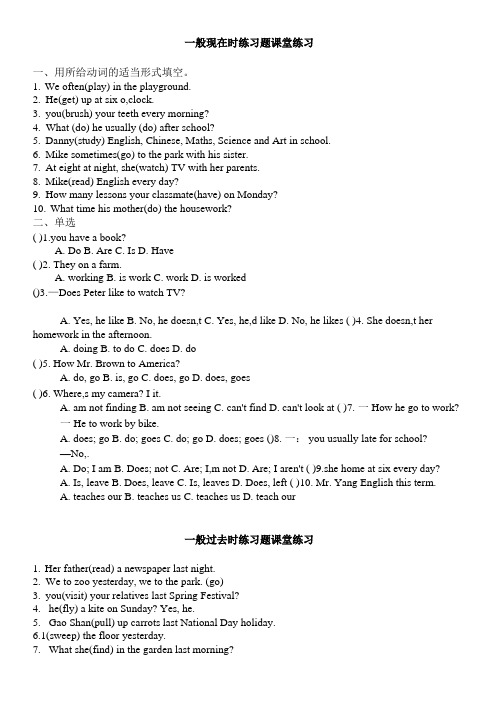
一般现在时练习题课堂练习一、用所给动词的适当形式填空。
1.We often(play) in the playground.2.He(get) up at six o,clock.3.you(brush) your teeth every morning?4.What (do) he usually (do) after school?5.Danny(study) English, Chinese, Maths, Science and Art in school.6.Mike sometimes(go) to the park with his sister.7.At eight at night, she(watch) TV with her parents.8.Mike(read) English every day?9.How many lessons your classmate(have) on Monday?10.What time his mother(do) the housework?二、单选( )1.you have a book?A. DoB. AreC. IsD. Have( )2. They on a farm.A. workingB. is workC. workD. is worked()3.—Does Peter like to watch TV?A. Yes, he likeB. No, he doesn,tC. Yes, he,d likeD. No, he likes ( )4. She doesn,t her homework in the afternoon.A. doingB. to doC. doesD. do( )5. How Mr. Brown to America?A. do, goB. is, goC. does, goD. does, goes( )6. Where,s my camera? I it.A. am not findingB. am not seeingC. can't findD. can't look at ( )7. 一How he go to work?一He to work by bike.A. does; goB. do; goesC. do; goD. does; goes ()8. 一: you usually late for school?—No,.A. Do; I amB. Does; notC. Are; I,m notD. Are; I aren't ( )9.she home at six every day?A. Is, leaveB. Does, leaveC. Is, leavesD. Does, left ( )10. Mr. Yang English this term.A. teaches ourB. teaches usC. teaches usD. teach our一般过去时练习题课堂练习1.Her father(read) a newspaper last night.2.We to zoo yesterday, we to the park. (go)3.you(visit) your relatives last Spring Festival?4.he(fly) a kite on Sunday? Yes, he.5.Gao Shan(pull) up carrots last National Day holiday.6.1(sweep) the floor yesterday.7.What she(find) in the garden last morning?8.It(be) Ben,s birthday last Friday9.We all(have) a good time last night.10.He(jump) high on last Sports Day.11.She likes newspapers, but she a book yesterday. (read)12.He football now, but they basketball just now. (play)13.Jim,s mother(plant) trees just now.14.they(sweep) the floor on Sunday? No, they.15.It(be) the 2nd of November yesterday. Mr White(go) to his office by car.16.Gao Shan(put) the book on his head a moment ago.17.Don,t the house. Mum it yesterday. (clean)18.What you just now? I some housework. (do)19.They(make) a kite a week ago.20.I want to apples. But my dad all of them last month. (pick)一般将来时练习题课堂练习( )1. There a meeting tomorrow afternoon.A. will be going toB. will going to beC. is going to beD. will go to be( )2. Charlie here next month.A. isn,t workingB. doesn,t workingC. isn,t going to workingD. won,t work( )3. He very busy this week, he free next week.A. will be; isB. is; isC. will be; will beD. is; will be( )4. There a dolphin show in the zoo tomorrow evening.A. wasB. is going to haveC. will haveD. is going to be( )5. 一 you free tomorrow? — No. I free the day after tomorrow.A. Are; going to; willB. Are; going to be; willC. Are; going to; will beD. Are; going to be; will be( )6. Mother me a nice present on my next birthday.A. will givesB. will giveC. givesD. give( )7. — Shall I buy a cup of tea for you?-.(不,不要。
初中英语8个时态讲解—中考必考-

初中英语8个时态讲解—中考必考英英英英英英英一般现在时一一一一一一一1、一一一一一一一一一一一。
She often speaks English.I leave home for school at 7 every morning.2、一一一一一一一一一一一一一一一一一一一一。
He seems to feel a bit down today.He works as a driver.3、一一一一一一一一一一一一一一一一一一一一一一。
Shanghai lies in the east of China.Columbus proved that the earth is round.Where there is a will, there is a way.一一一一一一一一一一一一一一一一一一一一一一一一一。
When Bill comes , ask him to wait for me.I shall go there tomorrow unless I’m too busy.一般过去时一一一一一一一一1、一一一一一一一一一一一一一一一一一一。
Jim rang you just now.Liu Ying was in America last year.2、一一一一一一一一一一一一一一,一一一used to do sth.一一一一一一一一一一一一一一一一一一When I was a kid, I often played football in the street.She used to visit her mother once a week.*一一一一:sb. used to do sth.一一一一一一一一一一一一一to一一一一一一一一一一一一sb. be used to sth./doing sth.一一一一一一一一/一一一一一一to一一一一一3、一一一一一一一一一一一一一一一一一一一一一一一一一一一一一一一一一一一一一一一一want, hope, wonder, think, intend一一一一一一一could, would一I wondered if you could have a word with me.I hoped you could help me with my English.Would you mind my sitting here?一般将来时一一一will / shall +一一一一1、一一一一一一一一一一一一一一一。
- 1、下载文档前请自行甄别文档内容的完整性,平台不提供额外的编辑、内容补充、找答案等附加服务。
- 2、"仅部分预览"的文档,不可在线预览部分如存在完整性等问题,可反馈申请退款(可完整预览的文档不适用该条件!)。
- 3、如文档侵犯您的权益,请联系客服反馈,我们会尽快为您处理(人工客服工作时间:9:00-18:30)。
英语时态八种基本时态讲解及练习一.概念:英语中表示不同时间发生的动作或存在的状态,需用不同的动词形式表示,这种不同的动词形式称为时态。
二.种类:(基本时态)一般现在时一般过去时现在进行时过去进行时一般将来时过去将来时现在完成时过去完成时三.用法:1)一般现在时表示经常发生或习惯性的动作或状态及客观现实和普遍真理。
一般现在时常以动词原形表示,但当主语是第三人称单数时,动词词尾加-s或-es。
2)句型结构:主语+V.(包括be动词)+宾语+…She is an engineer.He has breakfast at 6:00every day.3)注意:a)一般现在时通常与always , often , usually , every day , sometimes , once a week等时间状语连用。
I always watch TV at 8: 00 in the evening .They go home once a week .We usually do our homework at home .b)表客观现实或普遍真理。
The sun always rises in the east .The light travels faster than the sound .c)表永远性的动作或状态。
He lives in the country .4)第三人称单数变化形式。
a)一般情况动词在词尾加-s .come---comes speak---speaks work---works live---lives b)以o, s, x, ch, sh结尾的单词在词后加-es.do---does go---goes finish---finishes brush---brushes fix---fixes pass---passes watch---watchesc)以“辅音字母+y”结尾的单词变y为i加-es.Study---studies carry-carries cry---criesd)以“元音字母+y”结尾的单词直接加-s.play---plays stay---stays例句:我们每天晚上九点做作业。
我在早上七点半起床。
他每天七点去上班。
我们经常下午打篮球。
他喜欢音乐。
地球围绕太阳转。
火车六点出发。
5)否定句和疑问句。
a)-----He is an engineer.-----He isn’t an engineer.-----Is he an engineer?-----Yes, he is ./ No, he isn’t.b)----We get up at 7:30 in the morning .-----We don’t get up at 7:30 in the morning .-----Do you get up at 7:30 in the morning ?-----Yes, we do. / No, we don’t.c)----He likes music.-----He doesn’t like music.-----Does he like music?-----Yes ,he does./ No, he doesn’t .1)一般过去时表示发生在过去的动作或存在的状态,通常与表示过去的时间状语yesterday, last night ,some years ago, in 1990,in those days.等连用。
I was a student 6years ago.I went to Beijing last year.They saw a film last night .2)句型结构:主语+V.过去时+宾语+…例句:昨天他很忙。
去年他抽烟了。
两年前他去参军了。
他在1990年去世了。
3)否定句和疑问句。
a)----He was busy yesterday.-----He wasn’t busy.-----Was he busy?-----Yes, he was./ No, he wasn’t.b)----He smoked last year.-----He didn’t smoke last year.-----Did he smoke last year?-----Yes ,he did ./No ,he didn’t.c)----He joined the army in 1990.-----He didn’t joined the army in 1990.-----Did he join the army in 1990?-----Yes ,he did ./No ,he didn’t.4)动词过去式变化规则。
a)一般情况下的词加-ed.work---worked call----called laugh----laughedExplain----explained finish----finished knock----knockedb)以不发音的字母e结尾的单词直接加-d .live----lived change----changed smoke----smoked die----died graduate----graduated drive----drovec)以“辅音字母+y”结尾的单词,变y为i加-ed.study----studied carry----carried cry----criedtry----tried marry----marriedd)以“元音字母+y”结尾的单词直接加-ed.play----played stay----stayede)以“一个元音字母+一个辅音字母”结尾的单词应先双写这个辅音字母然后再加-ed. stop----stopped plan----planned pat----pattedf)动词不规则变化:do----did go----went come----came run----ran write----wrote begin----began drink----drank keep----kept leave----left sleep----slept make----made lie----lay dig----dug eat----ate know----knew cut----cut set----set let----let read----read hurt----hurt例句:我前天拿走了这本书。
去年我买了一辆自行车。
每天晚上我听音乐。
她通常待在家里。
两天前我完成了这项工作。
复习:1) I (be) a teacher 2 years ago.2) He (be) a student now.3) He (do) his homework at home every day.4) They (join) the Party in 1998.5) We (not eat) apples yesterday.6) We (not play) basketball every day.7) He (not go ) home once a week.8) I am 16 years old. (划线部分提问)9) I go to work at 8:00 every morning. (划线部分提问)10) They joined the Party in 1990. (划线部分提问)11) I went to Beijing last year. (划线部分提问)1)表示将来发生的动作或存在的状态,常与表将来的时间状语tomorrow, the day after tomorrow, next Sunday, soon, in a few days等连用。
2)句型结构:主语+will/shall+V.原形+…(第一人称用shall)I shall go to Shanghai tomorrow.They will have a meeting next week.----She will be 20 years old.----Will she be 20 years old?----Yes, she will./ No, she won’t .3)主语+will/shall+V.原形+…be(am, is, are)going toThey will have a meeting next Sunday.(will=are going to )----What will they do next Sunday ?----When will they have a meeting?4) be about to+V.原形I am about to leave school.不能与表示时间的副词连用。
They are a bout to set out.(√)They are about to set out soon.(×)复习题:1.He (do) his homework at school every day.2.They (finish) their work yesterday.3.We (visit) their farm next year.4.我半小时后要吃午饭。
5.他将骑自行车去学校。
6.他们下周日将去买汽车。
1)过去将来时是立足于过去某时,从过去的观点看将要发生的动作或状态。
主要用于宾语从句中。
2)基本结构:主语+would/should was/were going to +V.原形+…He said that he would have a meeting next week.(He says that he will nave a meeting next week.)They said we should leave school tomorrow.(They say we shall leave school tomorrow.)1)现在进行时表示现在或现在这段时间正在进行的动作。
通常与now, at present等时间状语连用。
2)基本结构:主语+be(am, is, are)+ v-ing +…You are listening to me carefully now.She is writing a letter this year.Look! They are dancing.We are studying English at present .It’s raining hard now.3)动词现在分词的构成①一般动词直接在词后加-ingdo– doing read - readingwork– working think – thinkingstudy– studying go – goingwatch– watching jump - jumping②以不发音的字母e结尾的动词,应先去掉e然后加– inglike– liking take – takingleave– leaving live – livingreceive– receiving dance – dancingcome– coming smoke – smokingwrite - writing③以“一个元音字母+一个辅音字母”结尾的动词,应先双写这个辅音字母然后再加-ingstop– stopping begin – beginningdig– digging swim – swimmingrun– running sit – sitting(注意:listen– listening open – opening eat – eatingrain– raining sleep - sleeping)现在分词构成口诀现在分词用途多,进行时态不可缺。
